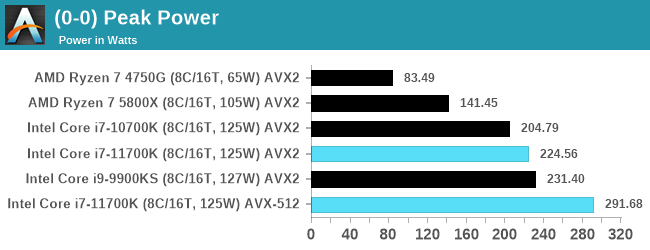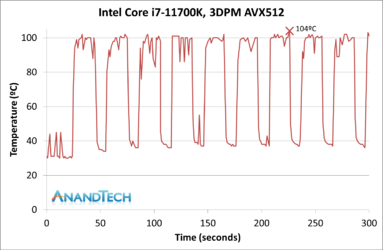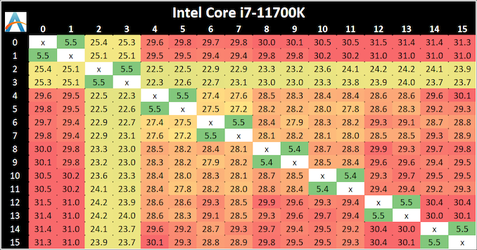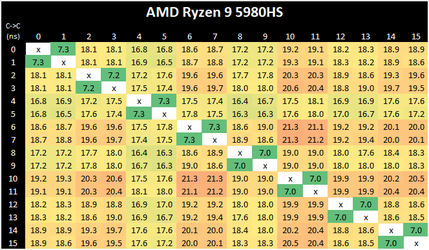- Joined
- Jul 19, 2017
So Intel has been struggling for years now to move on from Skylake. They've been stuck on 14nm for years now, allowing AMD to recover enough to launch Zen and eventually surpass intel in IPC for the first time since 2005.
Rocketlake is Intel's latest attempt to stem the bleeding. It's a backported form of Tiger lake, their 10nm architecture. This new architecture is supposed to bring with it IPC improvements to make it competitive with Zen's improvements. For highly technical reasons Intel's new core design has been tied to 10nm for years now. After comet lake showed there was no room to continue expanding their core count, Intel made the tough decision to backport their ice cove arch to 14nm and launch it as rocket lake, a band aid solution to tide them over until alder lake's "supposed" launch at the end of 2021.
Intel decided that the NDA on their chips would be lifted on the 30th of march, but chips could apparently go on sale on the 15th. Anandtech got their hands on a 11700k and reviewed it. Safe to say, it didnt go well.

Catastrophic power consumption. Even normally it is pulling 80W more power then AMD's 8 core, while often being slower in benchmarks. The only time rocketlake has any performance advantage is in AVX-512 workloads, where, as you can see, an 8 core is pushing nearly 300 watts. And when you dare to use that AVX 512:

Oh dear. 100C plus within 2 SECONDS of starting the workload. And this is on a cooler that has previously been able to handle 18 core HDET chips. This means that one of the 2 selling points of rocketlake is effectively worthless.
The reason behind this hot, heavy mess performing so terribly, often at times SLOWER then its predecessor comet lake? Well there are some theories, such as the L2 cache having to be halved to fit on the 14nm node, but the biggest chunk of evidence would be these latency graphs here:


As you can see, the intel 11700k has far higher latencies when jumping from one core to another. Now, Intel uses a Ringbus style core interconnect for communication, and last year we saw the 10900k's latencies becoming somewhat worrying, but there is no explanation for why an 8 core rocketlake is so abysmal. It's believed that the root cause is 14nm's wire length being too LONG for the ice cove CPU design, resulting in disastrous latencies wiping out whatever improvements Intel may have made IPC wise.
So what do you think of Intel's latest hot turd?
Rocketlake is Intel's latest attempt to stem the bleeding. It's a backported form of Tiger lake, their 10nm architecture. This new architecture is supposed to bring with it IPC improvements to make it competitive with Zen's improvements. For highly technical reasons Intel's new core design has been tied to 10nm for years now. After comet lake showed there was no room to continue expanding their core count, Intel made the tough decision to backport their ice cove arch to 14nm and launch it as rocket lake, a band aid solution to tide them over until alder lake's "supposed" launch at the end of 2021.
Intel decided that the NDA on their chips would be lifted on the 30th of march, but chips could apparently go on sale on the 15th. Anandtech got their hands on a 11700k and reviewed it. Safe to say, it didnt go well.

Catastrophic power consumption. Even normally it is pulling 80W more power then AMD's 8 core, while often being slower in benchmarks. The only time rocketlake has any performance advantage is in AVX-512 workloads, where, as you can see, an 8 core is pushing nearly 300 watts. And when you dare to use that AVX 512:

Oh dear. 100C plus within 2 SECONDS of starting the workload. And this is on a cooler that has previously been able to handle 18 core HDET chips. This means that one of the 2 selling points of rocketlake is effectively worthless.
The reason behind this hot, heavy mess performing so terribly, often at times SLOWER then its predecessor comet lake? Well there are some theories, such as the L2 cache having to be halved to fit on the 14nm node, but the biggest chunk of evidence would be these latency graphs here:


As you can see, the intel 11700k has far higher latencies when jumping from one core to another. Now, Intel uses a Ringbus style core interconnect for communication, and last year we saw the 10900k's latencies becoming somewhat worrying, but there is no explanation for why an 8 core rocketlake is so abysmal. It's believed that the root cause is 14nm's wire length being too LONG for the ice cove CPU design, resulting in disastrous latencies wiping out whatever improvements Intel may have made IPC wise.
So what do you think of Intel's latest hot turd?
Last edited:

